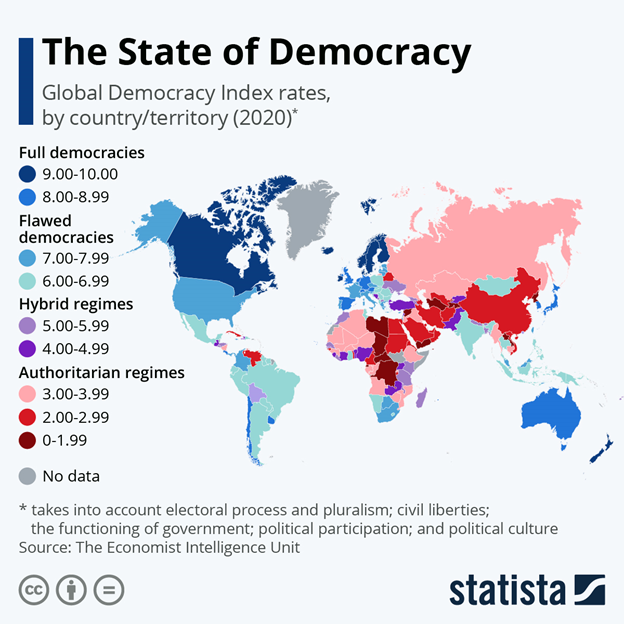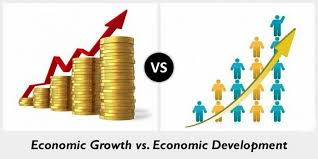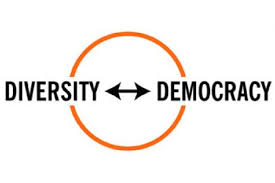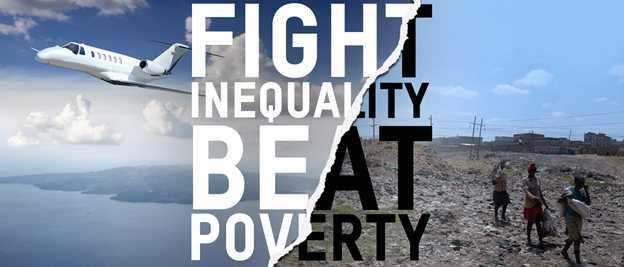CBSE Class 10 Civics Chapter 7 Outcomes of Democracy Notes, Explanation with Video and Question Answers
Outcomes of Democracy Class 10 – CBSE Class 10 Political Science (Civics) Chapter 7 Outcomes of Democracy Notes with Detailed explanation. Here is the complete explanation of the lesson along with all the exercises and Outcomes of Democracy Class 10 Important Question and Answers.
- How to assess Democracy outcomes?
- Dilemma of Democracy
- Outcomes of Democracy Class 10 NCERT Solutions
- MCQ Questions for Class 10 Civics Chapter 7 Outcomes of Democracy
- NCERT Solutions Class 10 Civics Chapter 7 Outcomes of Democracy
- CBSE Class 10 History MCQ Questions
- CBSE Class 10 Civics MCQ Questions
- CBSE Class 10 Geography MCQ Questions
- CBSE Class 10 Economics MCQ Questions
- NCERT Solutions Class 10 SST Important Question Answers
How do we assess Democracy’s outcomes?
Democracy is considered a better form of government when compared with dictatorship or any other alternate form of government. This is on account of the following reasons-
1. Promotes equality amongst citizens.
2. Enhances the dignity of the individual.
3. Improves the quality of decision making.
4. Provides a method to resolve conflicts.
5. Allows room to correct mistakes.
Top
Dilemma of Democracy-
Democracy is seen to be good in principle but felt to be not so good in its practice. This dilemma invites us to think about the outcomes of democracy. The first step towards thinking carefully about the outcomes of democracy is to recognize that democracy is just a form of government. It can only create conditions for achieving something. The citizens must take advantage of those conditions and achieve those goals rather than just blaming the idea of democracy if their expectations are not met.

Accountable, Responsive and Legitimate Government
1. There are some things that democracy must provide, such as-
2. People should have the right to choose their rulers as well as control them.
3. People should be involved in decision making wherever possible.
4. Accountability of the government to the citizens is a primary factor in a democracy.
5. To maintain a balance between deliberation, negotiation and ensure efficiency.
6. A democratic government will take more time to follow procedures before arriving at a decision. But because it has followed procedures, its decisions may be both more acceptable to the people and more effective.
7. Democracy must produce a government that follows procedures and is accountable to the people. This is ensured if there is transparency.
8. Democracy must be a government that is attentive to the needs and demands of the people and is largely free of corruption. However, it does not fair very well on these two fronts.

Outcomes of Democracy Related Links –
There is one respect in which democratic government is certainly better than its alternatives: democratic government is legitimate government. It may be slow, less efficient, not always very responsive or clean. But a democratic government is people’s own government. That is why there is an overwhelming support for the idea of democracy all over the world.
Economic Growth and Development
If we consider all democracies and all dictatorships for the fifty years between 1950 and 2000, dictatorships have slightly higher rate of economic growth. Economic development depends on several factors:
1. country’s population size,
2. global situation,
3. cooperation from other countries,
4. economic priorities adopted by the country, etc.

However, the difference in the rates of economic development between less developed countries with dictatorships and democracies is negligible. Overall, we cannot say that democracy is a guarantee of economic development. But we can expect democracy not to lag behind dictatorship on this front.
Reduction of Inequality and Poverty
It is reasonable to expect democracies to reduce economic disparities. Democracies are based on political equality. Parallel to the process of bringing individuals into the political arena on an equal footing, we find growing economic inequalities. In actual life, democracies do not appear to be very successful in reducing economic inequalities. Democracies like India and Bangladesh are examples of glaring inequality and although promises are made to the poor, much remains undone to bridge the heightening gap between the rich and the poor.
Accommodation of Social Diversity
A democracy should produce a harmonious social life. No society can fully and permanently resolve conflicts among different groups. But we can certainly learn to respect these differences and we can also evolve mechanisms to negotiate the differences. Democracy is best suited to produce this outcome. Ability to handle social differences, divisions and conflicts is thus a definite plus point of democratic regimes. Democracy must ensure accommodation and not lead to abuse by majority like it happened with Sri Lanka.

Dignity and Freedom of the Citizens
Democracy stands much superior to any other form of government in promoting the dignity and freedom of the individual. The passion for respect and freedom are the basis of democracy. Let’s take the case of the dignity of women. The long struggles by women have created some sensitivity that respect and equal treatment of women are necessary ingredients of a democratic society. The same is true of caste inequalities. Democracy in India has strengthened the claims of the disadvantaged and discriminated castes for equal status and equal opportunity.
Most individuals today believe that their vote makes a difference to the way the government is run and to their own self-interest. Democratic examination never gets over. As it passes one test, it produces another test. As people get some benefits of democracy, they ask for more and want to make democracy even better. The fact that people are complaining is itself a testimony to the success of democracy.

Outcomes of Democracy Class 10 Question Answers
1. How does democracy produce an accountable, responsive and legitimate government?
Answer.
The very essence of democracy is ensuring all the above. The government can be made accountable by framing and developing various laws and policies in which citizens can hold the government responsible if any of those policies and laws are not implemented or act against the welfare of the citizens.
People can start taking action when the government becomes insensitive about their aspirations, thus ensuring government’s responsibility. Tools like public protests, awareness campaigns and organized rallies etc. can be used to mete out their voice.
And, a democratic government is a legitimate government, as it is elected by citizens and enjoys their confidence and trust. This is enabled through free and fair elections.
2. What are the conditions under which democracies accommodate social diversities?
Answer.
Social diversities can be accommodated by focusing on all the communities of the society. The majority and minority communities should be given equal attention. Democracy is to avoid the tyranny of the majority. In democratic countries, both the majority and minority work together to achieve progress and development of the nation. It is equally important to understand that the rule of the majority is not expressed in terms of religion or languages. All groups should be equally represented and should have similar rights despite being differently numbered.
3. Give arguments to support or oppose the following assertions:
a. Industrialised countries can afford democracy but the poor need dictatorship to become rich.
b. Democracy can’t reduce inequality of incomes between different citizens.
c. The government in poor countries should spend less on poverty reduction, health, education and spend more on industries and infrastructure.
d. In a democracy, all citizens have one vote, which means that there is an absence of any domination and conflict. Answer.
a. Industrialised countries can afford democracy, but the poor need dictatorship to become rich – There is no relationship between democracy and wealth of the nation. The economic development of the nation is dependent upon the resources, the policies and the openness of the government to attract investment. If the dictatorship could have brought wealth in the nation, countries like Nigeria would be having all rich people, which is not the case in reality. However, democracies need to perform better on economic grounds.
b. Yes, democracy cannot reduce income inequality as there are sectional communities which have different professions. Income equality is not a value of democracy as democracy brings social and political equality. People have the right to vote and can access fundamental rights, but income is self-generated, and that depends on their ability to work. However, it can bring out policies in favour of the economically disadvantaged and try to bridge the disparities.
c. The statement is untrue. For any country to be developed, the focus should be on human resources. The country is made up of its people, and if the citizens are uneducated, ill and under-sufficient, the country cannot grow. The human development report judges a country’s development by measuring its education and health along with the income. Hence, it is important for a country to invest in health and education infrastructure. A strong human resource is a must to use all other resources.
d. The statement is partly true. Yes, democracy offers one vote to each of its citizens. However, it is not a fool-proof system that does not invite any conflicts. Take the example of India, which has a diverse diaspora. The social divisions in the society are reflected in the form of riots, protests and strikes. Hence, no democracy can eliminate social divisions.
4. Identify the challenges to democracy in the following descriptions. Also, suggest policy/institutional mechanism to deepen democracy in the given situations:
a) Following a High Court directive, a temple in Orissa that had separate entry doors for Dalits and non-Dalits allowed entry for all from the same door.
Answer:
The biggest challenge to democracy, in this case, is if such practices continue in the country, there is a threat that discrimination based on caste, colour and creed cannot be eliminated. However, for a democracy to flourish, these differences must not be allowed to creep in. Our Fundamental Right calls for equality of all citizens and hence if people indulge in such practices, legal actions must be taken against them. The Constitution clearly states that discrimination of any kind will be considered a crime and in such cases, serious actions must be taken against the wrongdoers so that the communal harmony of the country remains intact.
b) A large number of farmers are committing suicide in different states of India.
Answer: A large number of farmers are committing suicides in different states of India because of the rising economic inequality in the country. Farmers in villages grow crops on a small piece of land, and if the weather conditions do not stay stable, the farmer suffers serious loss. Framers are stuck in perpetual debt due to oppressive loan conditions etc. These cases have increased in the country over the past few years, and the poor farmers take such severe steps like committing suicide, as they are left with no other road to take. The government should provide these farmers with cheap fertilizers, seeds as well as other subsidies etc. while enabling formal sector to grant them more loans.
c) Following allegation of killing of three civilians in Gandwara in a fake encounter by Jammu and Kashmir police, an enquiry has been ordered.
Answer: Allegations of killing three civilians in Gandwara by the Jammu and Kashmir police in a fake encounter raises questions on the police force of the state. The challenge here is to control the power of the police and other authoritative officials. The authority of the police does not go unchecked in a democracy. Rule of Law shall always prevail and no one can mete out justice other than India’s judiciary.
Class 10 Important Videos Links
5. In the context of democracies, which of the following ideas is correct – democracies have successfully eliminated?
A. conflicts among people
B. economic inequalities among people
C. differences of opinion about how marginalised sections are to be treated
D. the idea of political inequality
Answer.
D. the idea of political inequality
6. In the context of assessing democracy which among the following is odd one out? Democracies need to ensure:
A. free and fair elections
B. the dignity of the individual
C. majority rule
D. equal treatment before the law
Answer.
C. Majority rule
7. Studies on political and social inequalities in democracy show that
A. democracy and development go together.
B. inequalities exist in democracies.
C. inequalities do not exist under a dictatorship.
D. dictatorship is better than democracy.
Answer.
B. inequalities exist in democracies.
More Resources
| Class 10 Science Important Questions and Answer |
| Class 10 Social Science Important Questions and Answers |
| Class 10 English Important Questions and Answers |
| Class 10 Economics MCQs |
Also See :
Class 10 Social Science Civics Lessons
- NCERT Class 10 Power Sharing Notes Chapter 1 Explanation
- NCERT Federalism Class 10 Notes | Civics Chapter 2 Explanation
- NCERT Federalism Class 10 Notes | Civics Chapter 6 Explanation
Class 10 Social Science History Lessons
- Chapter 1 The Rise of Nationalism in Europe, Class 10 History Explanation, Question and Answers
- Nationalism in India Class 10 Notes History Chapter 2
- Chapter 3 The Making of a Global World, Class 10 History Explanation, Question and Answers
- Chapter 4 The Age of Industrialization, Class 10 History Explanation, Question and Answers
- Print Culture and The Modern World, Class 10 History Explanation, Question and Answers